Highlighting Composting Successes from Food Matters Partners
In honor of International Compost Awareness Week, here are some examples of NRDC's Food Matters partners expanding composting throughout their municipalities.
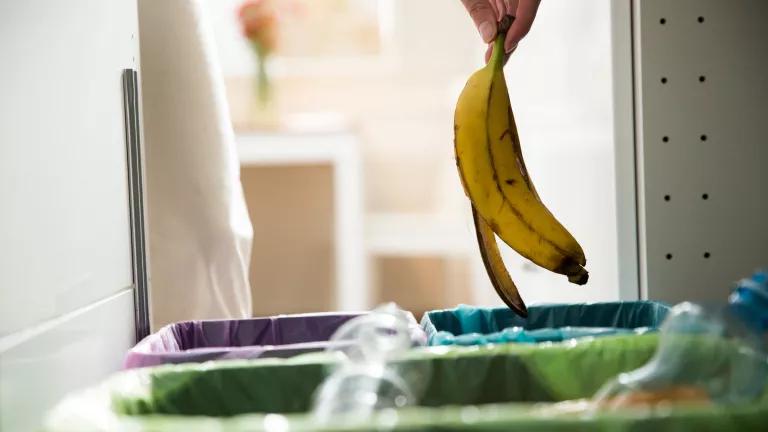
iStock
The best way to avoid the negative impacts associated with wasted food is not to waste the food in the first place. This concept is a cornerstone of NRDC’s food waste work, and is reflected in EPA’s Wasted Food Scale, in which prevention is ranked as the most preferred food waste solution as it has the greatest environmental and climate benefits. But no matter how good we get at not wasting food, ensuring that food that can be eaten is actually eaten, there will always be some scraps that we need to manage some other way. That’s where compost comes in. Composting our food scraps keeps valuable resources out of landfills and incinerators, helps the climate, builds healthier soils, strengthens communities, and offers a host of other benefits. As part of our Food Matters initiative, in which we advise city, county, and nonprofit partners implementing a range of food waste reduction strategies across the Wasted Food Scale, many of our partners are working on ways to expand composting across their municipalities. In honor of International Compost Awareness Week, a few of those examples are highlighted below.
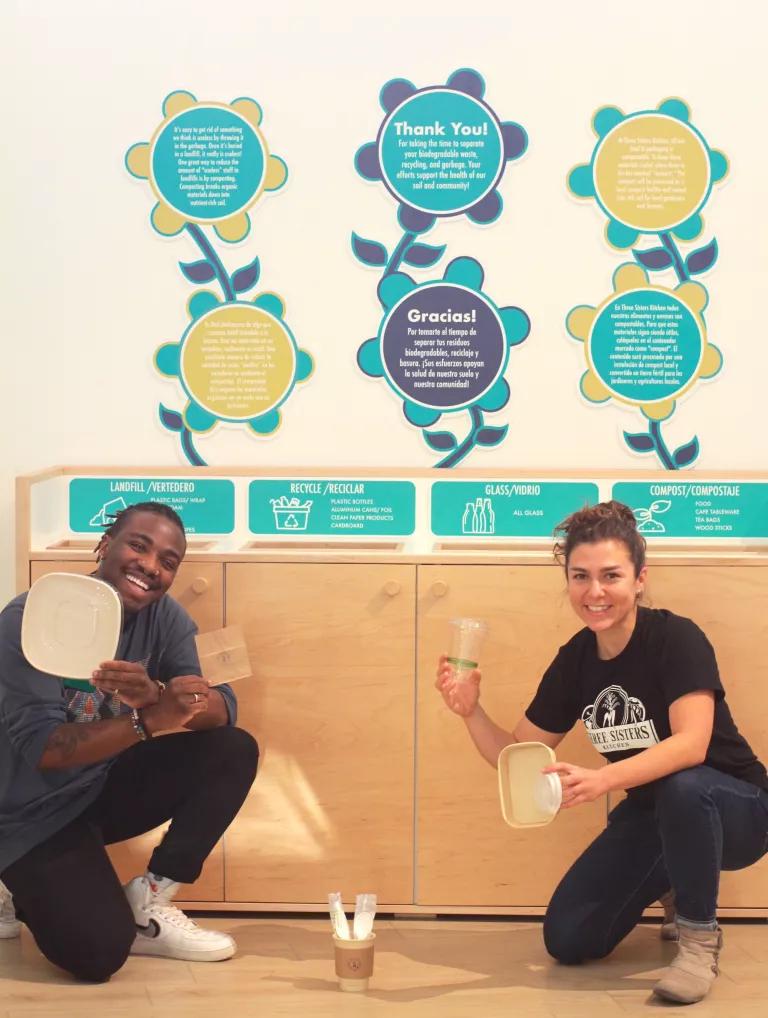
Three Sisters Kitchen
Albuquerque, NM:
The City of Albuquerque is taking a multi-faceted approach to encouraging composting citywide. After helping local partners win two federal grants that will dramatically expand composting in schools, in communities, and on farms, the city launched two community composting sites at senior centers and started a food waste composting pilot at a city-run commercial-scale kitchen and a concessions site run by Three Sisters Kitchen, a non-profit community food learning center in the heart of downtown Albuquerque. With support from NRDC, the food scrap pilot expanded to include 10 waste audits that informed site-specific recommendations for increasing food scrap composting while reducing contamination.
Community members in Albuquerque also have an increasing number of ways to engage in composting. The city teaches an interactive, in-person composting sorting game at community events, field trips, and in classrooms, with over 200 participants so far this year. The city recently launched a new webpage where residents can learn about composting and connect with community compost sites or find resources for composting successfully at home. The city also works with the Bernalillo County Extension Master Composters to provide climate-adapted, home-scale composting resources to community members, including community compost volunteers.
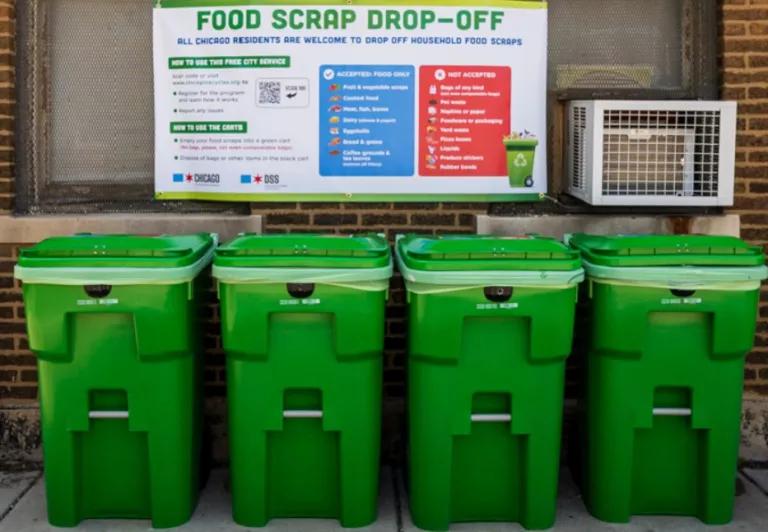
City of Chicago / https://www.chicago.gov/city/en/sites/chicago-recycles/home/food-scrap-drop-off.html
Chicago, IL:
The City of Chicago launched its first-ever free Food Scrap Drop-Off Program in October 2023. The program allows all Chicago residents to sign up online and bring their household food scraps to one of 17 locations across the city. The Department of Streets and Sanitation (DSS) manages the program and collects the material from the drop-off sites, where many types of food scraps are accepted. The food waste is delivered to the Harbor View Composting Facility, located in Chicago and operated by Whole Earth Compost, where it is turned into compost. As of early April 2024, over 4,600 households have signed up to participate and over 97 tons of food waste have been composted.
DSS also partnered with NeighborSpace on a Community Composting Pilot Program at six community gardens throughout the city. Each garden was provided a compost bin system and tools, as well as training for volunteer leaders on how to manage onsite composting of household fruit/vegetable scraps as well as garden trimmings. To date, approximately 130 households are participating in the program, and about 2.3 tons of fruit/vegetable scraps have been composted; this compost is available for use in the gardens.
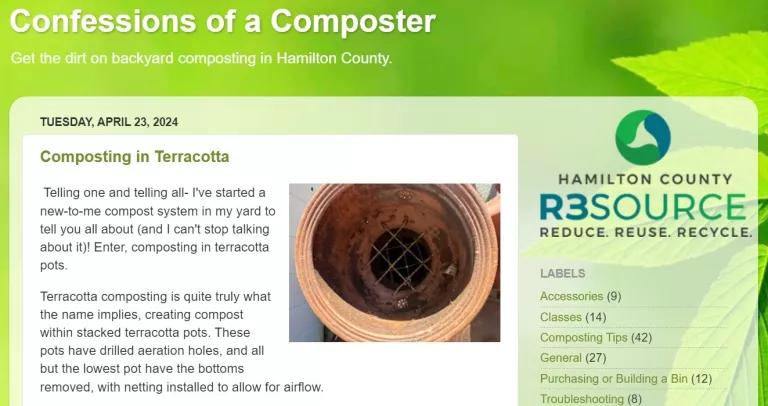
Hamilton County ReSource / http://confessionsofacomposter.blogspot.com/
Hamilton County, OH:
The 15-year 2024-2038 Hamilton County Solid Waste Plan, approved by the Ohio EPA, echoes the national goal to reduce food waste by 50% by 2030. Hamilton County ReSource engages with multiple audiences to address wasted food reduction to achieve this goal. First, ReSource has launched a study to analyze and identify opportunities to recycle organics in partnership with national leaders in the field. Separately, a team of engineering students from the University of Cincinnati have engaged with ReSource to study and recommend technologies to process food scraps in Hamilton County. Accelerating the work of the study, ReSource received a $500,000 USDA Composting and Food Waste Reduction Cooperative Agreement grant to help three composting sites increase their capacity to process food scraps. The three sites are geographically diverse, connected to agriculture, and represent Hamilton County’s commitment to increasing access to food scrap processing in marginalized communities.
Hamilton County continues to partner with local communities, businesses, and organizations to provide technical assistance and identify local solutions that reduce waste. ReSource supports backyard composting through annual seminars, an annual compost bin sale which provides 250-plus residents with access to subsidized backyard composters, and a popular composting blog. ReSource has also worked with two communities to establish free, public food scrap drop-off sites.

Metropolitan Government of Nashville and Davidson County
Nashville, TN:
In October 2023, Metro Waste Services (MWS) introduced Nashville’s first-ever Food Scraps Pickup Pilot (FSPP) to provide free curbside composting services to 750 Nashville households for one year. As Nashville and the middle Tennessee region struggle with diminishing landfill capacity, the FSPP is a significant step to help address the volume of food waste ending up in landfill. Participants for the program were selected through an application process to ensure diverse and equitable participation from residents within the city’s residential curbside service area. MWS worked with a contractor, Compost Nashville, to evaluate routes and service areas; identify priority areas for collection based on routing, demographics, and equity considerations; set up a customer portal for participants; and develop multilingual outreach materials. MWS staff then sorted through over 2600 applications to identify 750 households that best represented Nashville based on various demographics collected through census data.
The program aims to gather quantitative and qualitative data that will inform feasibility of an expanded program to provide collection of food scraps and other compostable material to Nashville residents, reducing household waste sent to landfill. In the first 25 weeks of the pilot, Nashville collected 54.3 tons of food scraps and other compostable materials (an average of 5.8 pounds per household per week) to be turned into nutrient-rich compost, which is available for sale to local residents and organizations. The program is made possible by strong partnerships with local contractors Compost Nashville and Compost Company as well as the support from NRDC, the city of Nashville, and MWS leadership.
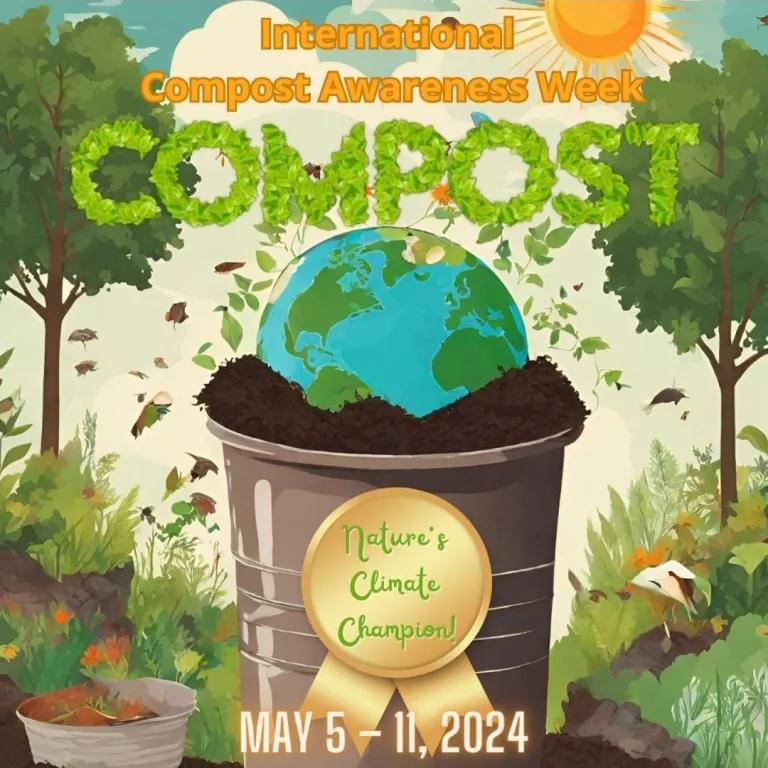
International Compost Awareness Week
Compost Research & Education Foundation / https://www.compostfoundation.org/ICAW/ICAW-Home
These highlighted examples are just some of the ways our city partners are augmenting and increasing access to their composting infrastructure. One of the great things about composting is that it can happen at any scale: larger industrial facilities, smaller community composting projects, and home composting. More and more cities are realizing the importance of promoting composting at all of those scales – and to help encourage cities to adopt more community composting, NRDC and our partners at the Environmental Law Institute will soon be releasing a model municipal zoning ordinance on community composting operations, to help municipalities provide for community composting as an appropriate and permissible land use; this policy will accompany the suite of model municipal ordinances we’ve already published. To celebrate International Compost Awareness Week, find out what your city is doing to support and expand composting, volunteer at your neighborhood community composting site, or grab a shovel (or a worm bin) and compost at home.




